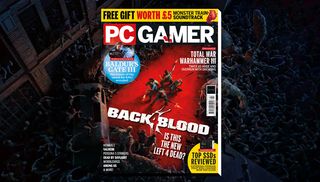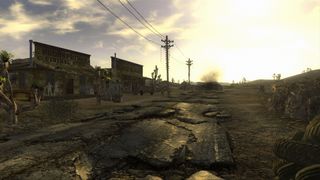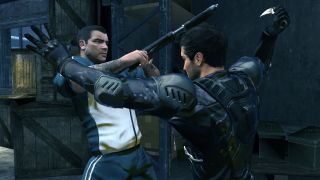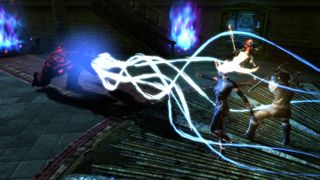How Obsidian built its reputation for masterful, yet buggy, RPGs
A look through the history of one of gaming's largest independent developers.


This article first appeared in PC Gamer magazine issue 353 in February 2021, as part of our 'DNA Tracing' series, where every month we delve into the lineages behind iconic games and studios.
The irradiated toilet bowl offers one of the bleakest dilemmas in Fallout: New Vegas. In hardcore mode, you have to stay hydrated in the desert or face dwindling stats and, ultimately, death. In a pinch, a gulp of 200-year-old piss water might just save your life. Temporarily, at least: in an interestingly ironic twist, the effects of radiation poisoning in Fallout are much the same as dehydration.
It's a literal poisoned chalice, the ultimate bad deal. Yet most players took it, glugging down the brown stuff at one point or another in order to survive.
It's the same dilemma faced by the large independent developer. Where small indies can keep costs low, and publisher-owned studios enjoy corporate security, outfits like Obsidian exist for many years in a mode of terrifying fragility. With hundreds of employees on payroll who need a cheque at the end of every month, these developers rarely have the option of turning publishers down. They need to sign the next project, balancing creative integrity with practical compromises. For a decade and a half, it was Obsidian CEO Feargus Urquhart's job to circle that toilet bowl without ever resorting to slurping the cursed liquid within.
"There is a seedy underbelly to game publishing and development, in which there are a lot of developers that have to make games they wouldn't choose at all to do, to keep the doors open," Urquhart told IGN Unfiltered a few years ago. "It's a really hard decision to make, particularly when the deal you're getting is maybe not even one that covers your cost. We've been offered a lot of that stuff, and we've made the conscious decision to turn it down."

Dark alliances
Today, Obsidian is owned by Xbox. But to understand the games the studio has made across its 17-year history—to square the brilliant writing with the bugs and the unfinished stories—you need to bear that older context in mind, the survival mode of the big contractor. The first compromise came immediately after Obsidian was founded. Its initial staff was almost entirely made up of refugees from the shuttered Black Isle Studios, which had worked on not only Fallout and Icewind Dale, but the Baldur's Gate: Dark Alliance series of action role-playing games. The developer had pitched a Dark Alliance-style Star Wars game to LucasArts—and believe it or not, was bummed out to be handed Knights of the Old Republic 2 instead. It was only when Urquhart called up Bioware's two doctors—Ray Muzyka and Greg Zeschuk, then building an RPG empire—that Obsidian came around to the business sense of accepting a project that wasn't its own idea.
In many ways, Knights of the Old Republic 2 set the template for Obsidian's run of troubled, yet inspired, RPGs. It delivered as a sequel to BioWare's epic story, while rejecting the black-and-white morality of the Force in favour of a nuance that felt subversive in the Star Wars universe.

Yet it also felt rushed, because it was: from the moment of signing the contract, Obsidian was given 15 months to make the game happen. Particularly galling was an extension the studio believed it had secured—only to later be told the game had to come out for Christmas 2004 after all. The team cut a whole planet, stripped back its branching ending, and sucked it up. With the mould set, Obsidian became the studio publishers went to for RPG sequels on a tight budget. Neverwinter Nights 2, Fallout: New Vegas, Dungeon Siege 3—all were accomplished but compromised. In tandem, the developer developed a reputation for first-class storytelling and runaway bugs, the latter of which it has only lately begun to shake.
The biggest gaming news, reviews and hardware deals
Keep up to date with the most important stories and the best deals, as picked by the PC Gamer team.
It seemed as if the right game could become Obsidian's Mass Effect, firing the team into the realm of huge franchise budgets, financial security and leisurely QA time.
Throughout the late 2000s, it certainly felt as if Obsidian was constantly on the verge of a megahit. Mainstream gamers had discovered a taste for choice and consequence, and the studio's skillset was perfectly aligned with the zeitgeist. It seemed as if the right game could become Obsidian's Mass Effect, firing the team into the realm of huge franchise budgets, financial security and leisurely QA time.
But the game was rigged. Obsidian did have its megahit in New Vegas, a densely reactive adventure which proved hugely popular despite its technical shortcomings. But as a contractor, the studio didn't stand to benefit nearly so much as publisher Bethesda did. Infamously, Obsidian missed out on a bonus by a single Metacritic percentage point, and Urquhart has since described the decision to withhold that cash boost as "petty". The bonus is a moot point, however—it was the studio's subservient position in the business that prevented it from reaping the potential rewards.

Confidence crisis
Kickstarter actually provided a partial way out. For Obsidian, a nostalgic return to the era of isometric RPGs was only beneficial. The move to 3D had never favoured its writing, which flourished in the literary space where players' imagination filled in the blanks for the distant character sprites. And once the studio had made the old-fashioned fantasy Pillars of Eternity, it used the same engine to build Tyranny, a brave and strange journey through the ruined realm of a Marxist Sauron. Like Knights of the Old Republic 2, Tyranny turned videogame morality on its head—casting you as a lieutenant who might at best sneak small acts of good into the running of an evil regime.
But Tyranny, and Pillars of Eternity 2 after it, sold badly despite critical acclaim. The response left the latter's game director, Josh Sawyer, confused—lacking confidence and unsure of how to push forward. The Outer Worlds, released last year, felt somehow RPG-by-numbers, as if Obsidian was newly afraid to follow its instincts.
In that sense, the Xbox acquisition is Obsidian's toughest challenge to date. While the studio's days as a toilet-orbiting survivor are over, security brings difficult questions. With proper funding, will the dream Obsidian game prove to be what the public wants? Or is the bittersweet scent of unfulfilled potential a key part of the charm? We won't know until the launch of its biggest pitch yet, the Skyrim-killer, Avowed.
Most Popular


